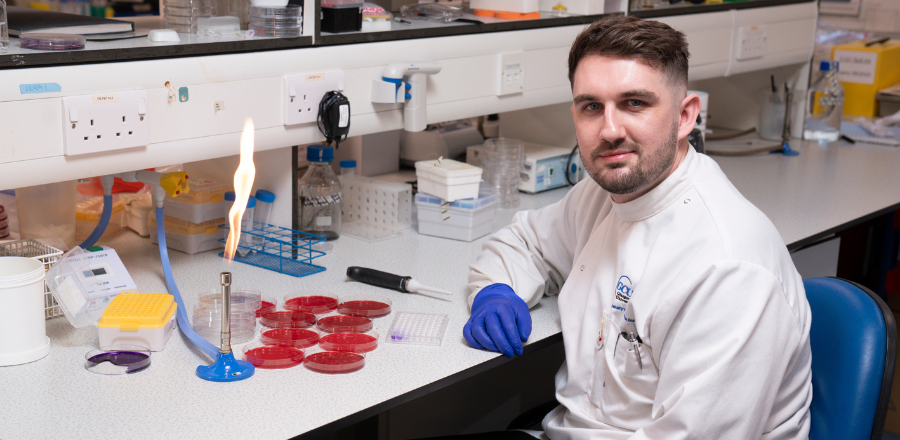Bioscientist scoops second award this year for bacterial vaginosis research

Bioscientist Dr Will Johnston is ending the year on a high after being awarded £20,000 from Tenovus Scotland medical research charity to boost his research into discovering new antimicrobials to treat bacterial vaginosis.
He is a postdoctoral researcher in the Glasgow Caledonian University School of Health and Life Sciences (SHLS) Biological and Biomedical Sciences Department and Research Centre for Health (ReaCH) Molecular Mechanisms of long-term conditions research
In July, Dr Johnston was awarded the prestigious Scottish Universities Life Sciences Alliance (SULSA) ECR Prize for his research. SULSA only awards the ECR Prize to outstanding early career scientists whose work shows excellent potential to make an impact in the field of life sciences.
Dr Johnston said he was delighted to receive his latest award and revealed that the money will go towards vital lab supplies such as buffer solutions and titration reagents, and a new piece of equipment called a MinION™ Mk1C, which is an all-in-one, portable DNA and RNA sequencer.
He won the funding for his project entitled Strategic drug repurposing for biofilm-associated bacterial vaginosis (BV) treatment, expanding on his work looking at discovery of new antimicrobials to treat BV. Dr Johnston is Principal Investigator on the project, while Lecturer in Clinical Microbiology Dr Ryan Kean is co-investigator and supervisor.
Dr Johnston said: “I’m very pleased to have been awarded this funding from Tenovus Scotland to further my research into drug repurposing here at Glasgow Caledonian University.
“Securing my own independent funding is a big step in my career as my postdoctoral research position ends, and I am thankful for the support of Dr Ryan Kean and the wider Department of Biological and Biomedical Sciences Department for helping me secure this grant.
“The money will be used to ‘repurpose’ existing medications as antibacterials. With antimicrobial resistance (AMR) on the rise, and a 10 to 15-year development period with approximately £1 billion required to develop a new antibiotic, we are in desperate need for new treatments of bacterial infections.
“One condition that we are focusing our efforts on in this project is BV, which impacts more than 25% of women of childbearing age globally with strong links to miscarriage and pre-term birth. Worryingly, over half of cases fail to respond to antibiotics.
“In this project, we are using a drug repurposing approach to find new and better treatments for BV. This involves taking existing drugs that are already approved for use in humans, and screening them against the pathogens responsible for BV.
“Using this approach, we can shorten the timeline and lower costs associated with developing entirely new drugs. Drug repurposing has been previously used for medications now in routine use here in the UK such as aspirin (a painkiller that has been repurposed for use in heart disease) and minoxidil (originally used for high blood pressure and now widely used as a treatment for hair loss), and so we are optimistic of success.”
Dr Ryan Kean said: “I am delighted that Will has received this prestigious award that will be instrumental as he develops his own independent research ideas. These are very competitive awards and it is a testament to Will’s continued success and key contributions to our department”.
Professor Linda Scobie, Head of the Department of Biological and Biomedical Sciences, said: “Since joining the Department and Ryan’s team, Will has continued to attract success. This builds upon the critical mass in the area of microbiology within SHLS and it is an exciting time for the field. He is a credit to us and we are looking forward to his continued development as an early career researcher here at Glasgow Caledonian University.”
